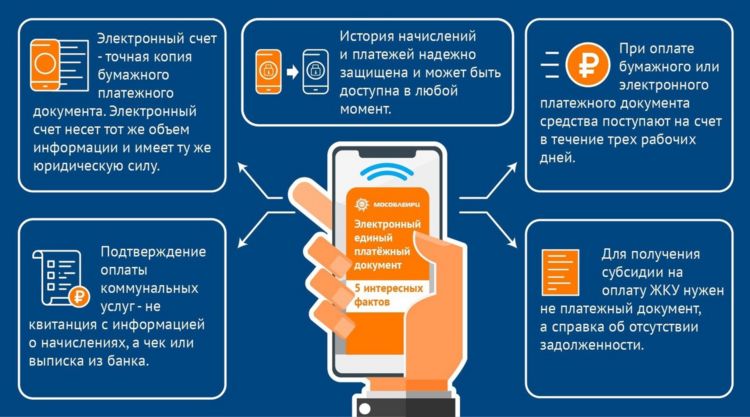Experiment to eliminate paper utility bills launched in Moscow Region
Published: by .

"The resolution on the start of the experiment has been signed, the task is to eliminate duplication of payment documents and make services more flexible and convenient for people," said Deputy Prime Minister of the Russian Federation Dmitry Grigorenko, announcing the start of the project.
How did you choose the participant?
The experiment was started in the Moscow region for two reasons. Firstly, residents of the region – with the exception of those few whose houses are managed by HOAs – receive a single payment document that contains everything: utilities, housing services, electricity, gas. It is always easier to convert one receipt from paper to electronic form. And secondly, the region began digitalizing utility bills several years ago. They even came up with a campaign called "Happy Subscription". Among those who subscribe to the mailing of electronic receipts, refusing paper ones, 10 prizes of 1.5 thousand rubles each are raffled off monthly. They are not given to the winners in cash, but are credited to their personal account – and the next month's bill will be 1.5 thousand less.
MosOblEIRC, which charges housing and utility bills to residents of the region, has its own loyalty program, "Utility Bonus." Those who pay bills using their personal account or the MosOblEIRC mobile app have access to discounts from the program's partners. These are movie theaters, hairdressers, and companies providing educational services. In total, the program has more than 100 partners. Of course, it is more convenient to pay in the app using an electronic bill than to manually enter the details from a paper one.

Photo: MosOblEIRC
With the help of programs and campaigns, by the end of last year, almost 2 million citizens in the Moscow region had refused paper bills.
Government services have been enabled
Among them was the author of these lines. And for me the main criterion was not even concern for the environment, although now with each electronic bill I am informed how many trees were saved, including with my help, which, I will not hide, is nice. And not utility bonuses, which I have never used in a year of using the electronic subscription. The main thing was the way in which the employees of the billing center distribute the bills in our house.
They don't drop the document into the mailbox completely, but so that half of the paper receipt sticks out. They say that otherwise those residents who rarely look into the mailbox miss the bills and then complain. In addition, it is easy to get the receipt hanging on the box without a key. However, it is just as easy to carry several receipts, for example, with a backpack. Conscientious citizens at the same time shove the documents to the addressees, less conscientious ones collect them in a pile and put them on the top box – look for your bill yourselves, residents. And also, if you go somewhere, your receipt will wait for you alone on the door, signaling to everyone entering the entrance: the owners are not home for several days!
2 million residents of the Moscow region have already refused paper utility bills
Having given up paper receipts, I quickly appreciated the convenience of electronic ones. They appear in the personal account earlier, and do not get lost among other household papers, and do not take up any space at home, and you can keep them for decades – nothing will happen to them, electronic ones. But my neighbor flatly refused to say goodbye to paper receipts: as she explained, she does not trust any personal accounts except "Gosuslugi".
So, the federal project for digitalization of utility bills in the Moscow Region is being implemented on the "Gosuslugi" portal. In your personal account on the regional portal, you need to agree to receive an electronic receipt – and you are a participant in the project. Payments will be uploaded to your personal account on the 1st of each month, and you can download and print them if necessary. You can also pay bills on the portal, just as many people pay fines. By the way, according to the regional Ministry of Housing and Public Utilities, more than half of Moscow Region residents pay for housing and public utilities online.
It's a voluntary matter.
But what about those who are in the smaller half? Those who have push-button phones, no computer or internet? For them, officials say, everything will remain the same. Participation in the project is voluntary. "Everyone will be able to choose how they prefer to receive payment documents – on paper or electronically," says Dmitry Grigorenko.
People can leave paper receipts as well; participation in the experiment is voluntary.
The experiment will last until October 1. After that, federal officials will decide whether to extend the innovation to the entire country.
Comments